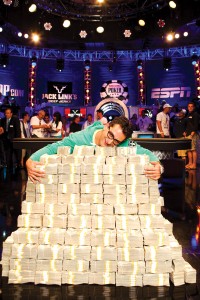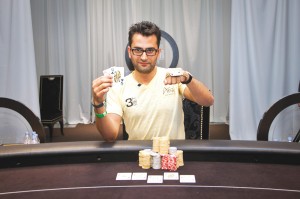********
On Nov. 4 and 5, millions of pro, serious amateur, and kitchen-table weekend poker players will be checking out the live coverage of the WSOP finals on ESPN. Antonio Esfandiari knows a thing or two about betting, bluffing, and pressure at this level. In 2012 the Bay Area native won the Big One for One Drop, a charity tournament that’s part of the WSOP, in which the buy-in for each player is $1 million. He took home more than $18 million from the Big One and won another bracelet at the WSOP-Europe that same year. Esfandiari, who also contributes as a broadcaster for ESPN and WSOP.com, said he thinks Benefield will adjust well to the final-table experience.
“The pressure is [felt] different on an individual basis — some people feel it more than others,” he said. “At the end of the day, it’s still just another poker tournament, only this time the entire poker world is tuned in to watch. [Benefield] understands that this is probably a once-in-a-lifetime chance. It really gets down to how he … handles pressure.”

The poker experts who rate Benefield as one of the most talented players at the table also warn that even his talent may not be enough to overcome his chip disadvantage. As the final table gets under way, Benefield will have the smallest chip stack, at 6.375 million, compared to the leader J.C. Tran’s 38 million. But anything is possible in poker with a little luck and skill.
In tournament poker, players all start with the same number of chips — 30,000 in the WSOP Main Event. The chips have no dollar value, but those who lose all their chips are eliminated from play. The last player standing will hold all the chips in play and take home the big money — the largest share of the combined entry fees of all players, minus a percentage for the casino.
Brian Rast, 31, a professional who has played with Benefield several times, agrees with Esfandiari’s assessment. Rast, who has won almost $5 million in tournament poker winnings and two WSOP bracelets in preliminary events, feels that the good news for Benefield is that, because he will be so short-stacked, his decisions will be pretty automatic –– mostly pushing his chips “all-in” when he has a decent hand or folding his cards quickly into the muck.
“I’ve played with David quite a bit over the years, between live cash games in Macau and Vegas and internet poker,” Rast said. “I’ve hung out with him away from the table a few times as well. I think he’s a really nice, intelligent guy. I think he plays poker very well, and he’s possibly the most skilled player at the table –– it’s between him and J.C. Tran. J.C. has more tournament experience by a lot, so I might give J.C. the edge in this department right now. I’m not sure –– it’s close. Fact is, David has a great poker mind.”
The game of poker features some brilliant math minds, and Rast chose mathematics to illustrate Benefield’s chances of bringing home the big money. First, with about 191 million chips on the table, Benefield’s beginning stack comes out to only about 3.3 percent of the total.
“Realistically speaking, even with a skill advantage, he is facing long odds,” said Rast. “He has about a 30-to-1 shot based on chips. If you add a bit for skill, I’d say he’s about 20 to 1. The difficulty for Benefield’s spot is that there isn’t much skill in working a stack that is five to 10 times the big blind.”
Translation: The “big blind,” the forced bet that rotates around the table to each player, will cut deeply into Benefield’s chip reserves, requiring him to make bets that, considering the size of his stash, are more dangerous.
“He’s going to be in all-in territory, and he’ll need some luck to build his chips up,” Rast said.
“More of the skill in poker is involved when you have a deeper stack and room to operate and make good decisions about pots to pick up by bluffing, good folds, and good value bets,” Rast said. “ At least at the start of the table, he doesn’t have enough chips to truly realize his skill advantage.”
********
Poker is a game based mostly on skill. The better player with a larger stack will win most of the time if the games are played over a long period. The best players in the world tend to come in the money and win again and again. But comebacks at the table are not unheard of, and luck does indeed play a role. It took a tremendous amount of skill for Benefield to make the final table, but a little luck going forward might help him stage a comeback.

Another Texan seemed to be in a similar situation in the 1982 WSOP Main Event. San Antonio-born Jack “Treetop” Straus, a lifetime gambler, is remembered for one of the biggest comebacks in poker history, inspiring one of the game’s oldest sayings: “All you need is a chip and a chair.”
Straus was among 104 entrants that year, and early on day one he moved what he thought were all his chips into a pot.
“Someone bet, and Jack moved all his chips in, raising the original bettor,” Brunson said. “He didn’t say ‘all in.’ After Jack lost the hand, he was getting up to leave, and there was a $500 chip [discovered] under a newspaper.”
A floorman reviewed the scenario and ruled that since Straus had not announced “all-in,” and his opponent only called his original bet, Straus could stay in the tournament. Treetop then went on a tear and turned that lone chip into a seat at a final table that included an impressive collection of poker greats. As chip leader, he became a stack-building bulldozer, eliminating seven of the nine players at the table before claiming the title, $520,000 in cash, and the bracelet.
Before playing the final table, Benefield planned on spending some time in Vancouver hanging out with some poker friends and working through situations that could come up at the final table, as well as playing online. He also planned to jet over to a few tournaments in Barcelona and Paris for more practice.
“Between his prior experience playing a lot of single-table, short-stack tournaments online and the fact that he’s probably going to study short-stack poker over these last few months … I’m sure [Benefield] is going to go in 100 percent ready to play both his short stack and the final table in general,” said Rast. “I doubt he’s going to need any advice from me or anyone about how to operate with few chips.”
Benefield could certainly use some Straus-style luck to get him beyond a ninth-place finish. Merely moving up one notch in finishing could earn him an extra $211,000. Moving up to two spots would hand him $1,225,000 for seventh place. But after outlasting so many thousands of competitors, most players regard the ultimate prize as the chance to etch one’s name among the poker elite and strap on that bracelet that is synonymous with poker greatness. Well, maybe not the last part, in Benefield’s case.
For him, a top finish “means winning $8,359,531,” he said. “I think the bracelet itself is a gaudy mess that couldn’t conceivably go anywhere other than in a safety deposit box. If I win, I will donate it to a good cause. You can hold me to that.”
Surviving some early all-in situations will be critical for Benefield. If he can accrue some chips to work with and use his skill after that to gain traction, you never know what could happen. Benefield could become the first Texan to win the Main Event title since Johnny “the Orient Express” Chan won back-to-back titles in 1987-88. Chan was born in China but grew up in Houston and was featured in Rounders, starring Matt Damon and Ed Norton.
“It seems only right that a Texan should win the world championship of Texas hold’em,” Benefield said. “I’ll try my best.”
Freelance writer Sean Chaffin’s new book is Raising the Stakes: True Tales of Gambling, Wagering & Poker Faces. He can be reached at seanchaffin@sbcglobal.net.











